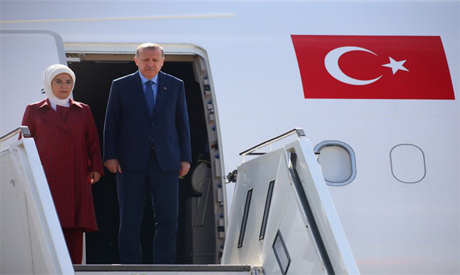
Turkish President Tayyip Erdogan with his wife Emine arrive at the Tegel airport in Berlin, Germany, September 27, 2018. (Reuters)
President Tayyip Erdogan, on the eve of a visit to Germany on Thursday, urged it to designate as a terrorist organisation the Fethullah Gulen movement, which Turkey blames for a 2016 coup attempt.
His call, in an article published in the Frankfurter Allgemeine newspaper, brought into focus the policy gulf between the two countries as Erdogan arrived, seeking to repair strained political and commercial ties.
Germany has so far said it needs more proof linking the network of supporters of the U.S.-based cleric, which Turkey labels the Gulenist Terrorist Organisation (FETO), to the failed attempt to overthrow the Turkish government.
Germany should "recognise FETO is responsible for the attempted putsch, just as Britain did," Erdogan wrote in an article, published on Wednesday on the newspaper's website.
Germany's refusal to extradite military officers Turkey accuses of participating in the coup attempt, after they claimed asylum, enraged Ankara. Berlin is concerned about the fate of tens of thousands of people imprisoned in the subsequent crackdown who included dozens of German citizens.
"We are pursuing the goal of increasing our trade and economic ties," Erdogan wrote. "For the sake of prosperity and the future of both our countries, let us increase our mutual interests and reduce our problems."
Erdogan's state visit to Germany, during which he will meet Chancellor Angela Merkel three times, comes with Turkey's economy in crisis. But he could face a frosty reception.
After years of breakneck growth, Turkey has seen its heavy foreign debt load increased by the lira's 40 percent slide this year - a sell-off that intensified after President Donald Trump imposed sanctions in retaliation for the detention of a U.S. pastor.
Underlining the cool reception Erdogan can expect, demonstrators gathered at a Berlin airport hours before his arrival, protesting over the state of press freedom in Turkey, where dozens of critical journalists are jailed. Much of central Berlin was locked down.
Despite the wariness, Berlin, ever conscious of the three-million-strong Turkish diaspora community that calls Germany home, is cautiously welcoming Erdogan's overtures.
"We have to talk with each other," junior foreign minister Michael Roth told public radio channel Deutschlandfunk. "There must be no other country outside the European Union with whom relations are so important and yet so difficult."
He added that it was "wholly unacceptable" that five German citizens were still imprisoned and that Turkey must move when it comes to the questions of democracy and the rule of law.
Both sides have dismissed suggestions that Turkey could seek financial aid from Germany or the EU. But a rapprochement could unlock valuable investment from Germany's manufacturers who have been deterred by Turkey's recent volatility.
Authorities, who fret at Erdogan's influence over German Turks, have warned Erdogan against campaigning overtly when he opens a mosque on Saturday in Cologne, home to one of Germany's largest Turkish communities.
Germany is also bound to Turkey via its reliance on Ankara to stem the flow of Syrian war refugees to prevent a repeat of events of 2015, when a million migrants arrived in Germany, convulsing European politics and weakening Merkel.
Against that backdrop, the expected announcement in Nyon, Switzerland, on Thursday of which of the two soccer-mad nations gets to host the 2024 UEFA championships will be the least of diplomats' concerns.
Short link: